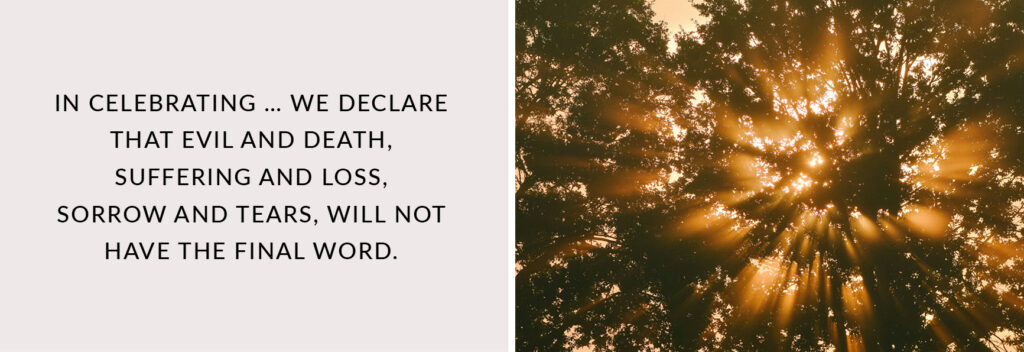Pushing Back the Darkness by Celebrating Light
By Sarah Mockler

Praise the Lord, praise the Lord,
let the earth hear His voice!
Praise the Lord, praise the Lord,
let the people rejoice!
It was a moonless night. Our group shuffled through patches of crusted snow, trying not to slide on the slipshod shoveled walkways up to the front door. The row of tiny apartments located on the sadder side of town stood unfriendly and unwelcoming. There was no warm glow coming from inside; no festive Christmas wreath or light-up reindeer stood on the front lawn. They just looked empty, barren, bereft. But there was still a reason to sing.
“Joy to the world! The Lord has come! Let earth receive her King!” Our little ensemble erupted into jubilant praise, caroling truth into the darkness that seemed to envelope these homes in silence.
Somewhere in the second verse, a porch light flickered on. And then another. Then a door cracked open. It revealed a peek into someone’s current trial as a man lay in a hospital bed, his wife propping the door open so he could hear the festivities outside. A couple doors down, an elderly lady pulled her bathrobe tight across her chest to lock out the winter chill, tears filling her eyes. After the last song, we delivered cookies tied with a humbly printed Gospel message and then moved on to the next row of apartments.
Some homes remained dark, with either the inhabitants not at home or the willful refusal of joy barred from entering their sphere. Some kept Christmas well and decorated with all they could. Some folks invited us to pray for them. Other lonely souls told us our little caroling band was the highlight of their season; that they wondered why people never caroled anymore.
It is an ironic pastime. Who would willingly choose to forsake the comforts of home, brave the cold, and sing their hearts out (regardless of musical ability) at the risk of offending others or making fools of themselves?
In our own simple way, our church caroling group let the earth hear His voice — a voice that still speaks straight into our hearts. It was a holy, humble act of defying the encroaching darkness that abounds by celebrating Light and that the wonders of His love can still be experienced today through repentance and faith.
An Intro to Celebrating
Christmas caroling may or may not be your thing. But it serves as an illustration of an illumined truth — that, of all people in this world, it should be Christians who know how to celebrate best and brightest. It has nothing to do with whether or not we choose to observe Christmas, but extends to any special day or just making the most out of everyday moments — because with Jesus, nothing is commonplace. And while some may say this is merely my particular personality coming to bear, it is actually rooted in God’s character and nature — for all celebration begins and ends with Him.

In the dusty days of the patriarchs, when God was giving the Law to Moses, He began to institute holy days — or holidays — special assemblies that were interspersed throughout the newly appointed calendar year to remind His people of what He had done and His unfolding plan of redemption in a sin-darkened world. As early as Exodus, we read about times of feasting that were designed to tether hearts back to Him and set His people apart from those who did not call upon the Name of the Lord in a special way. In Nehemiah and then in Esther’s day, we read about celebrations that took place because of works God had wrought in the midst of His people. There was reason to celebrate because salvation had come in part — though not in full. Jesus said He fervently desired to share the Passover meal, a feast, with His disciples prior to facing the Cross. We can see that there is a beautiful theme of feasting and celebration that winds its way through the Scriptures, unfolding fully in Revelation’s grand finale of the marriage supper of the Lamb.
But in the meandering meantime before He makes all things new — as we walk the valley of the shadow in the form of suffering or trial, and we face the groanings of this present world through wars or persecution — we have the privilege of proclaiming the goodness of God. In the ugly face of evil, we can actively push back the acceleration of darkness by finding beauty that persists alongside the mire, celebrating what is good and lovely, and focusing on life and light in the midst of calamity or chaos.
Scripture says that the earth is “full of the goodness of the Lord” (Ps. 33:5), but we often can’t see it in the face of ungodliness or spiritual darkness. Dear reader, we must train our eyes in faith. Imagine with me a king’s banqueting table laden with the choicest, most sumptuous offerings. And then rehearse with me the familiar words of Psalm 23, “Thou preparest a table before me in the presence of mine enemies…” (v. 5 KJV). This is the table God has prepared for His children in this fallen world. It is one of abundance that is aware of its enemies but not overtaken by them because they are celebrating beauty and delighting themselves in His presence.
Pushing Back the Darkness
From a cold prison cell, a nostalgic Dietrich Bonhoeffer scratched a letter to his parents. The holidays were hastening on and so was the Nazi darkness that seemed to choke out all thoughts of merry-making. Bonhoeffer’s words are aflame with passion as he writes, “We can, and should also, celebrate Christmas despite the ruins around us … I think of you all as you now sit together with the children and all the Advent decorations — as in earlier years you did with us. We must all do this — even more intensively because we do not know how much longer we have.”
One world war before Bonhoeffer entered the scene, Oswald and Biddy Chambers endured a sweltering Egyptian summer as war rumbled in the distance. As temperatures soared to over 130 degrees and plagues of flies threatened everyone’s sanity, the Chambers sought to relieve the mounting tension in the military camp by hosting a British tea. Armed with the power of hospitality, Biddy and her companions opened the doors of their tent to pack 400 soldiers inside so that, “…for a short time war worries receded and they could be men without fear, a cup of tea and a plateful of cookies at their side.” A photo of their laudable hosting survives to reveal a sea of bland, sandy-colored uniforms, but gleaming beautifully in the center stands the hostess herself, dressed head to toe in white, complete with a broad-brimmed hat.
Bonhoeffer’s encouragement was to celebrate “even more intensively” in the face of evil. Biddy’s example was to make a fashion statement demonstrating that not even a world war could loosen her tenacity to behold beauty amidst darkness. Both of these examples hold a profound spiritual truth. When we hold fast to all that is good, true, and beautiful we are, as one author described it, enacting a holy war against evil’s encroachment: “To gather joyfully is indeed a serious affair, for feasting and all enjoyments gratefully taken are, at their heart, acts of war. In celebrating … we declare that evil and death, suffering and loss, sorrow and tears, will not have the final word.”

Celebrating light
Such celebration starts before the holidays and begins with a heart that wants to hallow everyday occurrences through a redeemed light. For example, another bleak midwinter snowfall becomes a fresh reminder that though our sins were as scarlet, Jesus washes them white as snow. Though our hearts grow heavy with stories of persecution in countries closed off to the Gospel, we rejoice that the number of Christians living in places like North Korea has recently grown between 200–400%.5 Or when faced with the loss of a loved one, we can comfort our hearts that Jesus is coming soon to make all wrongs right. (See 1 Thessalonians 4:13–18.)
The discipline of cultivating celebration is different than the pop-culture movement to “romanticize your life” by overlaying a filter on your life to make it more attractive than it really is. I love little niceties like drinking my coffee in a beautiful mug or wearing a dress “just because” — but the truth is that romanticizing our lives, if not properly rooted, keeps us living in a fantasy world pretending evil doesn’t exist.
The discipline of finding beauty and celebrating light is a divinely instilled disposition that flows from our identity in Christ and is rooted in a joy that no man (and no thing) can take from us. (See John 16:22 and 1 John 1:5.) We, who are filled with His Spirit, have the ability to scatter heavenly sparkle. It’s not what we do to create our own happiness, it’s what we do because He has secured our happiness. It is not a filter we lay on top of our life — it is our life.
The art of cultivating an attitude of daily celebration is one of the keys to the overcoming, triumphant life. It’s a mindset that knows that death has been swallowed up in victory and a heart that beats to the tune of, “This is the day that the Lord has made. [I] will rejoice and be glad in it!” (Ps. 118:24).
I recognize that as we enter this naturally celebratory time of year, it can be hard to rally our aching or bewildered hearts. It seems insensitive to celebrate “even more intensively” when the world is in chaos or when those we love, or we ourselves, are facing personal tragedy or loss. But in all things, there is an opportunity to give thanks. In all things, there remains a thrill of hope that, while we may encounter tribulation, Jesus has already overcome the world. (See John 16:33.) And that, my friends, is reason to celebrate!
Conclusion
As women, we are often the keepers of tradition, the festivity-makers, the creative forces behind celebrating those we love. We are the stewards of our seasons. And it’s up to us to herald God-framed beauty and honor joyful, meaningful moments.
Let’s rally around the celebrations located in the calendar year that are deserving of praise: the birth, death, and resurrection of Christ; weddings and anniversaries; spiritual milestones; the birthdays of loved ones and friends. Let’s get behind what God is pushing forward: sinners finding new life in Christ, the God-appointed change of seasons outside our window, the persecuted church burning brightly, and more.
Each of these stands as a mini-memorial of God’s goodness; a micro-holiday smack dab in the midst of the mundane. And, in uncovering it, we bolster not only our own hearts, but the hearts of those around us as we praise the Lord for the great things He has done and will continue to do before He returns.

This article was originally published in Issue 48.
For more content, explore our article collection.